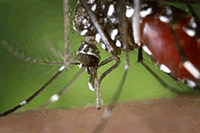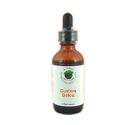 Arthropod/Vector
Bacteria
Chemicals
Fungus /Mold
/ Yeast Metals Parasites Virus Other Arthropod/Vector
Bacteria
Chemicals
Fungus /Mold
/ Yeast Metals Parasites Virus Other
|
West Nile
The West Nile Virus produces one of three different outcomes in humans. The first is an asymptomatic infection (approximately 90% of West Nile Virus infections in humans are without any symptoms); the second is a mild febrile syndrome termed West Nile Fever; the third is a neuroinvasive disease termed West Nile meningitis or encephalitis. The second infection known as the febrile stage has an incubation period of 2 to 8 days followed by fever, headache, chills, diaphoresis (excessive sweating), weakness, lymphadenopathy (swollen lymph nodes), drowsiness, pain in the joints and symptoms like those of influenza or the flu. Occasionally there is a short-lived truncal rash and some people experience gastrointestinal symptoms including nausea, vomiting, loss of appetite, or diarrhea. Symptoms are generally resolved within 7 to 10 days, although fatigue can persist for some weeks and lymphadenopathy can last up to two months. The more dangerous infection, encephalitis, is characterized by similar early symptoms, but also a decreased level of consciousness, sometimes approaching near-coma. Deep tendon reflexes are hyperactive at first, later they are diminished. There are other more complicated extrapyramidal disorders such as akinesia (inability to initiate movement) and akathisia (inability to remain motionless) that can develop. Recovery is marked by a long convalescence with fatigue. More recent outbreaks have resulted in a deeper study of the disease and additional rare outcomes have been identified. The spinal cord may become infected, marked by anterior myelitis with or without encephalitis. WNV-associated Guillain-Barré syndrome has been identified and other rare effects include: multifocal chorioretinitis (eye infection), hepatitis, myocarditis, nephritis, pancreatitis, and splenomegaly. |
|


